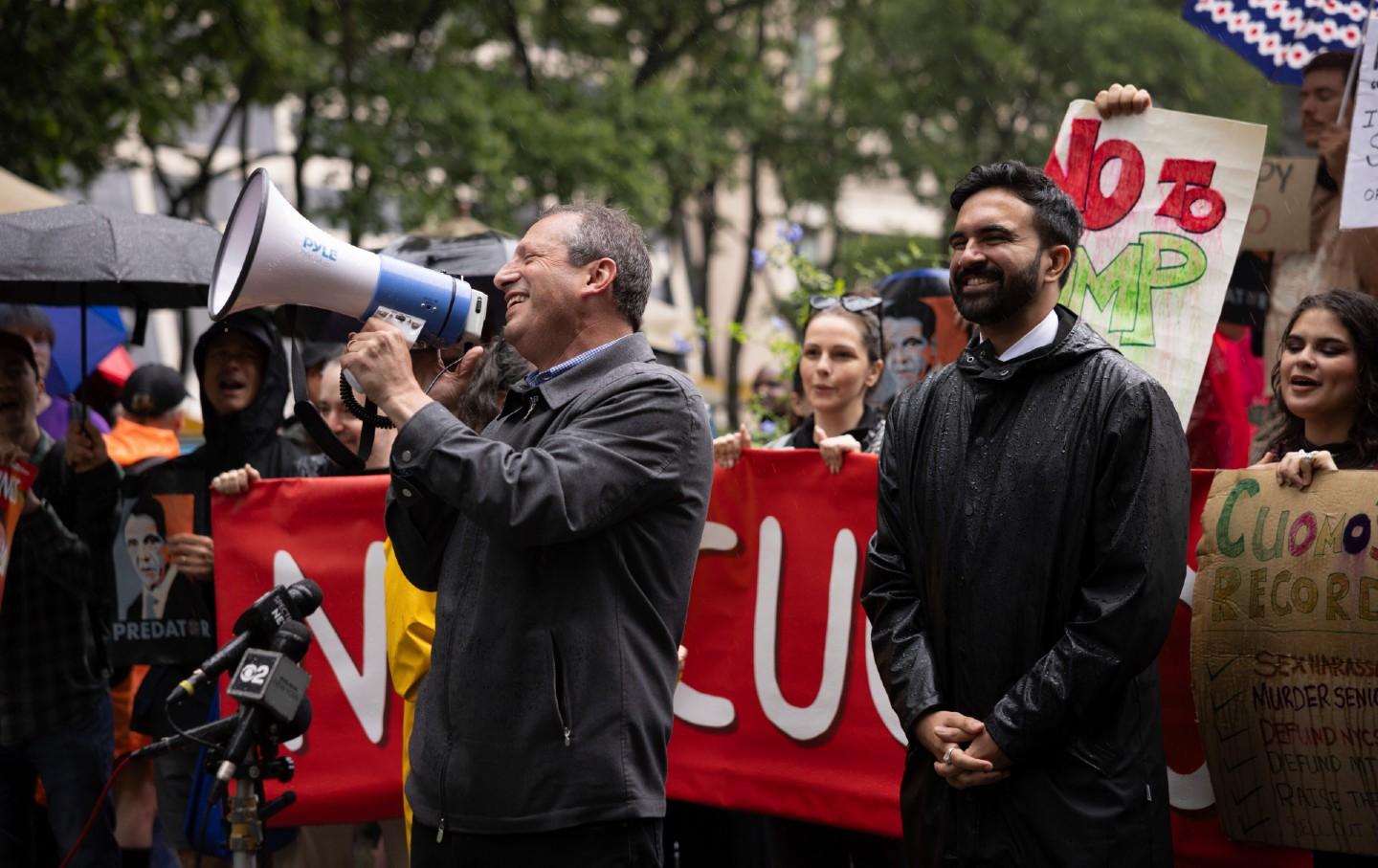June 19, 2025
Mamdani’s campaign deserves credit for offering a clear, inspiring, progressive message. But ranked-choice voting is also helping to make him competitive.

With a week left until New York’s Democratic mayoral primary, one might have thought that former governor Andrew Cuomo would be measuring the drapes at Gracie Mansion. Real estate developers, corporations like Doordash, a smattering of billionaires and even Billy Joel have shoveled cash into his campaign, with his Super Pac spending more money than any other outside force in the city’s political history. This is on top of his entering the race with a major name-recognition advantage, amounting to a 20- or 30-point lead as recently as May.
But according to a new poll, Zohran Mamdani—the insurgent state assemblyman and democratic socialist whom The Nation recently co-endorsed along with fellow mayoral candidate New York City Comptroller Brad Lander—has pulled ahead of Cuomo for the first time.
And while Mamdani’s campaign deserves credit for offering a clear, inspiring, progressive message, the fact that he is competitive can also be partly credited to New York City’s ranked-choice voting (RCV) system. It’s a winning system for candidates who would otherwise be sidelined or would cannibalize one another’s support—and for voters who can finally cast their ballots based on policy rather than pragmatism.
America’s politics have long been dominated (or diluted) by first-past-the-post voting. In it, citizens cast their ballot for one candidate, and whoever receives the most votes wins. Straightforward as it seems, this method forces an either/or choice, often resulting in voters’ deciding between the lesser of two evils. Not only does this reinforce a two-party duopoly in general elections, but it also incentivizes a binary choice between the two leading candidates in primaries.
For the candidates themselves, the system encourages scorched-earth campaigns that divide parties and inflame the narcissism of small differences. The progressive Senators Bernie Sanders and Elizabeth Warren came into the 2020 Democratic presidential primary as allies with much more in common ideologically than their centrist opponents. But there was no electoral incentive for either of them to form an alliance with the other. Instead, they fought to consolidate a minority faction within the party, and got mired in a grisly and public feud. The mudslinging did leave one person standing—Joe Biden.
In contrast, RCV makes it possible for dark-horse candidates to work together. After Mamdani’s campaign reached the fundraising limit, he urged his supporters to donate to a fellow anti-Cuomo candidate, Adrienne Adams. Adams, in turn, has maintained a focus on criticizing Cuomo, even deleting a tweet that was perceived as a swipe at Mamdani. These contenders are making it clear they truly believe—as The Nation’s editorial board wrote in our endorsement—New Yorkers deserve better than Andrew Cuomo.
Current Issue

Critics of ranked-choice voting argue that it’s too confusing, but successful implementations of the system in other jurisdictions suggest otherwise. In Alaska’s 2022 congressional special election, the first statewide RCV election there, 85 percent of people who cast their ballots said they found the method to be simple. It also enabled the Democrat Mary Peltola to fend off an extremist challenge from Sarah Palin. Maine has also seen promising results from RCV, with 60 percent of its voters favoring the system. Cities like Minneapolis and Cambridge, Massachusetts, have enjoyed higher turnout after the implementation of RCV.
But RCV is only as effective as its participants make it. Ahead of New York City’s mayoral primary in 2021, I wrote a column expressing high hopes for how the debut of RCV could reshape the city’s politics. But that race became chaotic for other reasons.
Scott Stringer and Dianne Morales’s campaigns collapsed. Advocacy groups had to un-endorse and re-endorse—in some cases, multiple times. There was a progressive effort to coalesce around Maya Wiley, including a belated endorsement from Alexandria Ocasio-Cortez. Meanwhile, pragmatists who felt Eric Adams and Andrew Yang lacked substance turned to the sanitation commissioner, Kathryn Garcia. If Wiley and Garcia had cross-endorsed, one of them might have defeated Adams. Instead, Adams won the primary in the final round by just over 7,000 votes.
This time, the mayoral candidates seem to have learned. On Friday, Mamdani and Lander cross-endorsed each other, encouraging their supporters to rank the other second. Mamdani explained the decision with a refreshing mix of idealism and realism: “This is the necessary step to ensure that we’re not just serving our own campaigns—we’re serving the city at large.” This was followed by another cross-endorsement, between Mamdani and former assemblyman Michael Blake, on Monday. And the national progressive movement is much more united than it was in 2021, with both Ocasio-Cortez and Sanders endorsing Mamdani in the home stretch this time.
By treating each other like allies rather than adversaries, the anti-Cuomo coalition might just prevail. If anything, it is the establishment wing of the New York Democratic party that is struggling to coalesce—as evinced by The New York Times’ non-endorsement endorsement that, if you squint, could be perceived as encouraging New Yorkers to support Cuomo, Lander, hedge fund manager Whitney Tilson, or flee the city.
The Nation has a long history of covering New York’s mayoral races. Although no New York mayor has been elected to higher office since 1869—just four years after the magazine was founded—the office has long held fascinating implications for American progressivism.
Popular
“swipe left below to view more authors”Swipe →
Fiorello La Guardia, whom Mamdani and Lander have both named as the greatest mayor in the city’s history, took office at the height of the Great Depression and led the city through the Second World War. Over 12 years of cascading crises, he transformed the city with a bold vision characterized by expanding public housing and public spaces, curbing corruption, and unflinchingly supporting the reforms of the New Deal.
Now, nearly a century later, New Yorkers have an opportunity to bring the city into a new era once again. And ordinarily, making that kind of change possible would require making a tough choice. But if it happens this time, it will be because of a ranked choice.
Every day, The Nation exposes the administration’s unchecked and reckless abuses of power through clear-eyed, uncompromising independent journalism—the kind of journalism that holds the powerful to account and helps build alternatives to the world we live in now.
We have just the right people to confront this moment. Speaking on Democracy Now!, Nation DC Bureau chief Chris Lehmann translated the complex terms of the budget bill into the plain truth, describing it as “the single largest upward redistribution of wealth effectuated by any piece of legislation in our history.” In the pages of the June print issue and on The Nation Podcast, Jacob Silverman dove deep into how crypto has captured American campaign finance, revealing that it was the top donor in the 2024 elections as an industry and won nearly every race it supported.
This is all in addition to The Nation’s exceptional coverage of matters of war and peace, the courts, reproductive justice, climate, immigration, healthcare, and much more.
Our 160-year history of sounding the alarm on presidential overreach and the persecution of dissent has prepared us for this moment. 2025 marks a new chapter in this history, and we need you to be part of it.
We’re aiming to raise $20,000 during our June Fundraising Campaign to fund our change-making reporting and analysis. Stand for bold, independent journalism and donate to support The Nation today.
Onward,
Katrina vanden Heuvel
Publisher, The Nation
More from The Nation

Forcing people to move or prohibiting their mobility are two sides of the same colonial or neocolonial coin.
Aviva Chomsky

It would be the most severe and abrupt disruption to global ecological systems. Yet in many mainstream climate narratives, it’s rarely discussed.
Norman Solomon

This Juneteenth we need to discard the caricatures of King that we so often see and learn from what he actually did and believed.
Jeanne Theoharis

Israel’s assault on the Iranian capital has brought destruction and grief to civilian neighborhoods.
Mahmoud Shaaban

In its bigotry and deceitfulness, US v. Skrmetti is destined to be seen alongside Plessy, Dobbs, Dred Scott, and all of the court’s other most notorious decisions.
Elie Mystal


